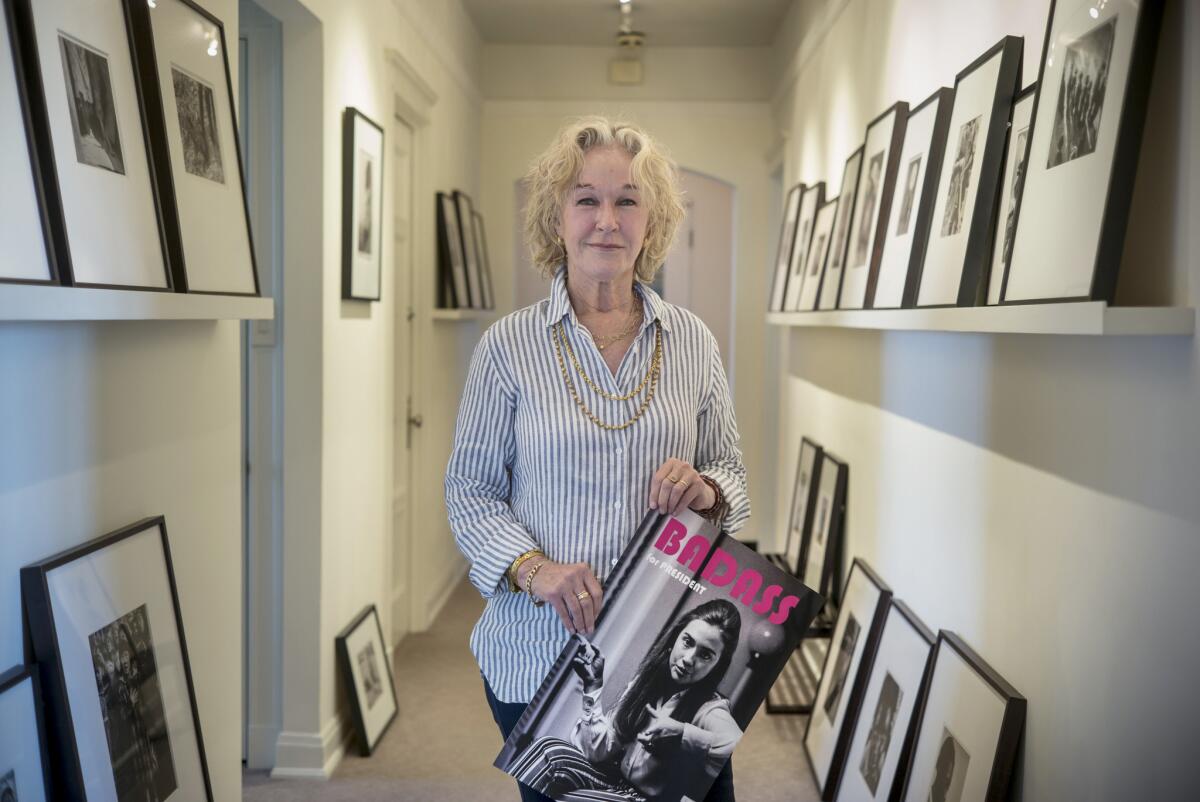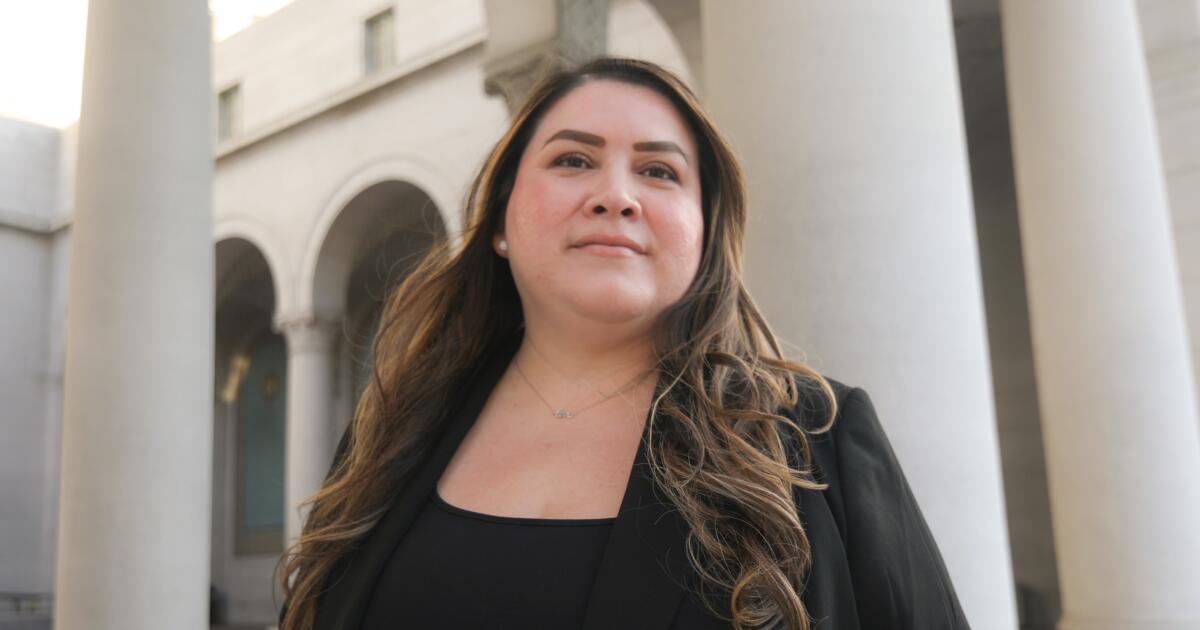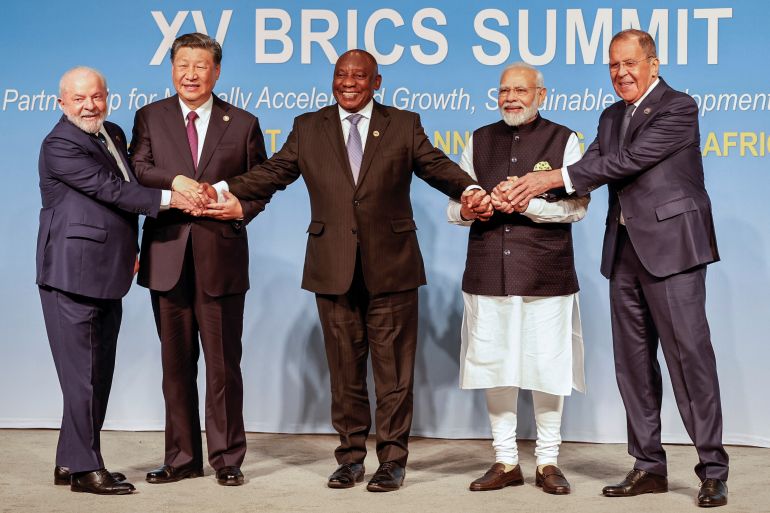Meet one of Hillary Clinton’s biggest donors in California. They hardly ever talk politics
Reporting from San Francisco — When Hillary Clinton parachuted into Los Angeles recently, some of the well-heeled donors who swarmed her brought unsolicited campaign advice, while others brought ambitions of White House appointments. Susie Tompkins Buell brought a bag of dry-roasted chickpeas.
It was fitting that Buell, a wealthy San Franciscan who ranks near the top of the sprawling national network of Clinton benefactors, was obsessing about the candidate’s nourishment. Few people in the orbit of the Clintons have done more for their care and feeding than this 73-year-old fixture of Bay Area philanthropy and salon society who wanted nothing to do with politics — she didn’t even vote — until a chance meeting with Bill Clinton well into her adult life.
Buell not only has become a fundraising powerhouse since then. She has also become Hillary Clinton’s soul mate. Theirs is among a handful of friendships that have been key to fueling the candidate’s ambitions, providing emotional and financial sustenance. It reflects the uncanny Clinton ability to build and maintain unyielding loyalty from the people positioned to help them the most – even people, like Buell, who have no business interests or political aspirations the couple might advance. In many cases, the bonds have only solidified through the stresses of scandal, electoral disappointment and Democratic Party rivalries that the Clintons have powered through.
See the most-read stories this hour >>
The network has been most valuable in California, where Hillary Clinton is raising more cash than anyplace else. How Susie Tompkins Buell became a hub of that operation is a uniquely California story.
Buell never thought she would be rich. She was but a 21-year-old who had chosen work as a keno runner in Tahoe over college when she randomly stopped by the roadside to pick up Doug Tompkins, a hitchhiking beach bum who, like Buell, had an unexpected mastery of entrepreneurship and getting in front of trends. The two eventually married and together built a fortune and a cultish following around the clothing lines they created: North Face and Esprit.
But it wasn’t until they divorced and Buell found herself at a retreat at the Esalen Institute that she got curious about the Clintons. Buzz about Bill Clinton at that Big Sur haven of mindfulness intrigued Buell. It was 1991, and the fledgling presidential candidate had inspired one of the speakers at the event, New Urbanist architect and thinker Peter Calthorpe, with his ideas on building and strengthening community, a topic of interest to Buell.
Susie Tompkins Buell, poses with a poster she designed supporting Hillary Clinton for president at her penthouse apartment.
(David Butow / For the Times )
So on a whim, and with a stroke of luck in timing, she dropped in at an event for Clinton while passing through Sacramento on her way home from Tahoe.
She quickly found herself at the head table. The conversation was memorable.
“I told him I was getting divorced and how I had worked with my husband all these years,” Buell said. “He really wanted to know what it was like, and he started talking about Hillary and how she was nervous that night because she was giving a speech at Wellesley,” her alma mater. They talked about the crushing poverty Clinton had seen on the campaign trail, Buell recalled, “and how much people were relying on government. I really wanted a president who would look out for them.”
She decided at that moment it should be Clinton. The next day, she wrote him a $100,000 check.
But the Clinton campaign was confused. Such large gifts usually come with requests for face time with the candidate or, at the very least, donor perks like ticket packages to the party convention and star-studded fundraising events.
Election 2016 | Live coverage on Trail Guide | Track the delegate race | Sign up for the newsletter
“They asked me what I wanted,” she said. “I remember saying, ‘I want him to be president.’ I had no idea about how the money part of this worked.” Indeed, the only candidate who had ever received a cent from her before then was Mark Buell, the man who is now her husband and who long ago unsuccessfully ran for county supervisor. He got $500.
The donation to Clinton might have been a one-off but for the relationship that bloomed when Hillary Clinton approached Buell to personally thank her. The women clicked immediately, and Buell grew more enamored when she saw Clinton deliver an impassioned Mother’s Day address at Glide Memorial Church, a hotbed of leftist activism in San Francisco’s Tenderloin district.
“I was attracted to Bill Clinton, but as soon as I met Hillary, it was much deeper for me,” she said.
Buell hasn’t stopped giving to the Clintons since. More than $15 million has made its way from Buell’s bank account to the campaigns and causes of the Clintons. Untold millions more have been raised by her, often at her gorgeous Pacific Heights penthouse apartment, a mandatory stop on the fundraising circuit for prominent liberals. The menu that iconic chef Alice Waters prepared when Bill Clinton dropped by in March 1996 is framed in the kitchen.
“I can’t even count the number of events I have been to at the house,” said Lt. Gov. Gavin Newsom, who first got to know Buell years ago, when he ran a wine shop and was good friends with her daughter. “It is a perfect venue overlooking the bay. There is an austerity to it. It is an opulent building, an opulent view. But the space itself is austere.” The rooms are sparsely but carefully appointed. Pieces worth more than a small condominium share rooms with stylish items plucked from far-flung flea markets. Every window has a panoramic view.
“It is a perfect backdrop to focus less on the surroundings and more on the occasion,” Newsom said.
The occasion is almost always political activism.
“The environment, women’s rights, children’s rights, equality, all of this,” said Democratic Sen. Barbara Boxer of California, ticking off in an interview the causes she has been involved in with Buell. “Susie comes through. She doesn’t say, ‘Put my name down,’ and take a back seat.”
As Buell got entrenched in politics, her relationship with Hillary Clinton began to move beyond it. Clinton writes in one of her books about a conversation between the two while the then-first lady was under siege by Congress amid its investigation into her Whitewater real estate investment. “My free-spirited friend Susie Buell said she didn’t follow all the dramas going on back in Washington, but she did have something to say to me: ‘Bless your heart.’ That was all I needed to hear,” Clinton wrote.
Much later, Clinton showed up at Buell’s apartment to meet her dying brother, a prominent surgeon who was staying with Buell while undergoing painful cancer treatments. “Most people would say, ‘I am sorry I never met your brother,’ or send their best. She just goes right into it,” Buell said. “She wasn’t taking advantage of him. They laughed. It was just sweet. It was one of the tenderest times in my life. … Her comfort with the situation was very moving.”
Buell said she regrets how few people see that side of Clinton.
“I remember once saying to her: ‘Can’t you just be yourself, Hillary?’ ” Buell said. “When there are not cameras around, she really lets it fly. She said, ‘You know what happens? They will get a moment of me expressing something and then say, “There she goes again, the crazy.” ’ Experience has trained her to be so cautious.”
But Clinton also sees a side of Buell that many candidates never get to see: the one that doesn’t talk politics.
“I don’t want to be one more thing she has to think about,” Buell said. “She knows who I am, she knows how I feel. We don’t talk shop. … She doesn’t need one more person to say, ‘What do you think about the Benghazi report?’ ”
This is the same donor who showed up at a high-stakes fundraiser for President Obama near the end of his first term and told him to knock off the small talk when he began to genuflect. Then she launched into a scold about his failure to get a landmark climate change bill through Congress.
“We don’t talk shop,” Susie Tompkins Buell says of her friendship with Hillary Clinton.
(David Butow / For the Times )
Newsom, who says Buell “holds your feet to the fire” when candidates get her support, let out a knowing chuckle when asked about her reluctance to push Clinton. As Buell and other climate activists fought for years to kill the Keystone XL pipeline, candidates who did not stand with them were getting an earful from her. Except Clinton, who stayed neutral through most of the battle.
“They have a deep friendship, and that transcends politics in many respects,” he said. “She has a loyalty to the Clintons that is extraordinary, and it is unbreakable.”
It’s not that Buell is star-struck. She is constantly in the company of celebrity. Meryl Streep gushed in an email about Buell’s “open, welcoming mien.” Waters happened to text while Buell was talking with a displaced former California reporter, and at Buell’s behest, recommended where in Washington to dine.
Bill Clinton emailed to say, “Susie has been my friend for almost 25 years,” and express gratitude “for her constant love and support for Hillary.”
And Gloria Steinem has also been Buell’s friend for years. She recalled in an interview coming to speak about feminism to Esprit employees in the 1980s, long before it was fashionable for big companies to try to raise the consciousness of their workforce. Buell’s then-husband vetoed her plans to advertise in the fledgling Ms. magazine, so Buell sidestepped him by writing a check to subsidize subscriptions for universities.
“She is a self-educated person in the best sense,” Steinem said.
Buell stopped selling clothing long ago, but she never stopped marketing her brand. Lately, she has been working on her “Badass for President” project, a more hipster-oriented line of Clinton campaign memorabilia than the less-daring goods sold in the campaign store. A mock-up poster in her office has the logo emblazoned over a black-and-white photo of young Hillary Clinton in stylish ’60s attire and a coffeehouse conversation pose.
The fundraising events she holds are among the fastest-selling tickets in the city — especially when they are at her apartment in the penthouse of a landmark red-tile-roof building on a Pacific Heights hilltop where the views are dreamlike and the history is rich.
Buell says she was one of the lonely Democrats in the old-money-heavy building when she held her first fundraiser for Bill Clinton there. She had to quickly patch together a bunch of linens to cover the picture windows that the president’s detail warned would be a security risk. Clinton joked that it was better to be looking at the linens than shattered glass. The Secret Service once got stuck in the utility elevator there for an hour after too many of the agents piled in.
They know their way around better now. There are at least three other big Democratic donors in the building now, and sometimes they team up to hold multifloor events. Obama once joked that he had been through so many times he was starting to feel like a resident. Buell expects that she and her neighbors soon will be holding another multitiered event in the building for Hillary Clinton soon. The haul from such events is in the millions of dollars.
“It works great,” she said. “As long as the Secret Service is clear that they can’t all pile into the utility elevator at once.”
And what’s next for Buell if Clinton wins? Probably more of the same, she said.
“I am absolutely not interested in getting appointed to something,” she said. “I have the perfect life.”
follow me: @evanhalper
MORE FROM POLITICS
Who gives money to Bernie Sanders? About 1 in every $4 came from people who aren’t working
Donald Trump gets crash course in policy to face off against Hillary Clinton



